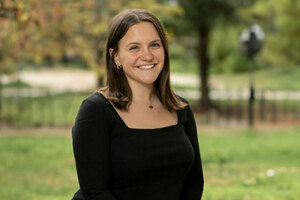
Grace Connors (Class of 2023), a recent graduate from the Kroc Institute with a major in computer science and a supplementary major in peace studies, has been selected as a spring 2024 Scoville Peace Fellow. The Herbert Scoville Jr. Peace Fellowship is a prestigious program aimed at recent college and graduate school alumni interested in working with non-profit and public-interest organizations addressing peace and security issues.
Connors has been placed with ReThink Media, a strategic public relations and communications organization specializing in media for security, rights, and democracy. While the position is remote, the program requested that Connors relocate to Washington, D.C., where she is based at the Keough School of Global Affairs’ Washington office to conduct her work. At ReThink, Connors is part of the Peace and Security team, where she contributes to projects related to nuclear nonproliferation and anti-militarism.
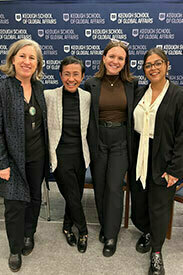
Nobel laureate, Maria Ressa,
Grace Connors, and
master of global affairs
student, Fatima Faisal Khan
at the Digital Democracy Forum
“Currently, the anti-militarism portfolio looks at the Pentagon budget and the prevention of regional war in the Middle East,” said Connors. “Our nuclear non-proliferation portfolio is primarily looking at the RECA expansion that was passed in the Senate last month and protecting down-winder communities that have been impacted by nuclear testing.” The Radiation Exposure Compensation Act, or RECA, aims to compensate individuals exposed to radiation during the Cold War era while working in uranium mines or living downwind from atomic weapons tests.
Connors gets to use her programming experience to assist with media audits, using machine learning to study media and narrative trends over time. She is also preparing to work on an upcoming project focused on nuclear relations between the United States and China.
“This has been a really interesting experience,” she said, of working in strategic communications. “I’m learning a lot and considering these issues not only from a policy perspective, but also from a strategic perspective in terms of selecting target audiences who care about these matters.”
Scoville Fellowships are highly competitive and designed for people who have already demonstrated a strong interest in the field and are considering working on international peace and security issues with public-interest organizations, the federal government, academia, or media.
As a testament to her interest in peace studies, Connors kept busy in the interim between her graduation and this fellowship. Last summer, she co-authored a research paper with Madhav Joshi, research professor and associate director of the Peace Accords Matrix. “The Taliban’s Quest for International Recognition: An Analysis of their Engagement with Domestic and International Actors since August 2021” was published in October 2023 and is a culmination of a long-standing project initiated by Joshi tracking the Afghan peace process. In fall 2023, Connors interned for the start-up company, Warc Africa in Accra, Ghana, whose mission is to help subsistence farmers out of poverty. There, she assisted with both data analytics and monitoring and evaluation of the organization’s new climate-conscious farming initiative.
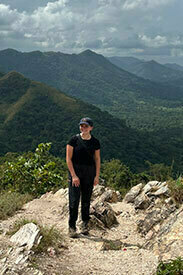
eastern region of Ghana
Connors' interest in peace studies was first sparked during her freshman year when she took Introduction to Peace Studies. “The class presented tangible ways of addressing many structural issues I had learned about growing up,” she said. “After three weeks, I was hooked.”
The experience of studying abroad in Rwanda, where Connors participated in a program focused on post-conflict reconciliation and peacebuilding, coupled with her coursework, solidified her desire to pursue a career in peacebuilding and international security.
“I had known that peacebuilding was a career from learning about it in my peace studies classes, but my time working in Rwanda really proved to me that this was something I could do and that vocationally felt right,” she said. “Regardless of the direction it took me, I knew that peacebuilding would inform everything that I do. From the moment you start learning about the foundations of peace studies, you can’t help but view the world in a different way.”
While abroad, Connors explored post-conflict reconciliation and peacebuilding. “We were able to learn from people who had lived through the violence and people who have been responding to the violence in the years since,” she said. Following that experience, she spent five weeks working with Never Again Rwanda, an anti-genocide organization. “I became involved in their advocacy work and was also able to work on the tech-development side. It was an informative experience, enabling me to see firsthand what peacebuilding looks like as a career.”
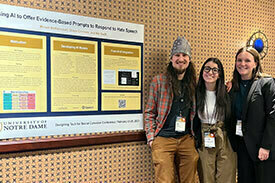
team, Nik Swift (MFA student) and
Miriam Bethencourt (Class of 2023)
Another formative experience for Connors was a course on digital peacebuilding taught by Lisa Schirch, Richard G. Starmann, Sr. Professor of the Practice of Peace Studies. “That course was amazing,” she shared. “I am so grateful to have taken that class because it gave me the opportunity to better understand where I want to focus my career, showed me examples of individuals and companies already paving the way forward, and connected me with Lisa, who has served as a great mentor to me over the past few years.”
For her final paper in the class, Connors teamed up with Miriam Bethencourt (Class of 2023) and Nik Swift (master of fine arts candidate) for a project focused on using artificial intelligence (AI) to detect and respond to hate speech on social platforms. That project continues today, and Connors now works with Schirch as a consultant with the Kroc Institute’s PeaceTech and Polarization Lab (PTAP). She and Swift have tailored the focus of the project, working to develop a way to use AI to train counter-speakers on how to respond to hate speech on social platforms.
Thanks in part to the Kroc Institute’s financial support through PTAP, Connors and Swift were also able to attend and participate in two conferences--Building Tech for Social Cohesion in San Francisco and the Build Peace Conference in Nairobi--that helped them fine-tune their project’s focus and connected them with Cathy Buerger of the Dangerous Speech Project, with whom they’re collaborating to further their research on counter-speaker movements with the help of a small grant through the Civic Health Project.
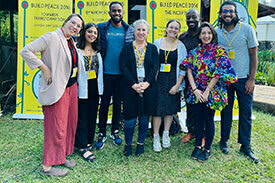
2023 Build Peace conference in Nairobi,
with a mix of Notre Dame graduate
students, professors and alumni
Following her fellowship, Connors intends to continue exploring the world of digital peacebuilding. “It is such a diverse field, in that technology can be used for peacebuilding purposes, and peacebuilding can be used to respond to challenges posed by technology,” she said.
Wherever she ends up, Connors hopes to play a role in helping people and ensuring technologies and structures that are developed work for positive humanity.
“I can’t say enough good things about peace studies,” Connors gushed. “It truly is the coolest major on campus.”